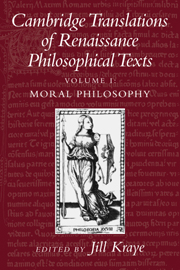Book contents
- Frontmatter
- Contents
- List of Translators
- Preface
- PART I CONCEPTS OF MAN
- PART II ARISTOTELIAN ETHICS AND THE SUPREME GOOD
- PART III ARISTOTELIAN ETHICS AND CHRISTIANITY
- PART IV PLATONIC ETHICS
- PART V STOIC ETHICS
- 16 Coluccio Salutati
- 17 Angelo Poliziano
- 18 Justus Lipsius
- 19 Francisco de Quevedo
- PART VI EPICUREAN ETHICS
- Bibliography of Renaissance Moral Philosophy Texts Available in English
- Index Nominum
- Index Rerum
18 - Justus Lipsius
Published online by Cambridge University Press: 05 June 2012
- Frontmatter
- Contents
- List of Translators
- Preface
- PART I CONCEPTS OF MAN
- PART II ARISTOTELIAN ETHICS AND THE SUPREME GOOD
- PART III ARISTOTELIAN ETHICS AND CHRISTIANITY
- PART IV PLATONIC ETHICS
- PART V STOIC ETHICS
- 16 Coluccio Salutati
- 17 Angelo Poliziano
- 18 Justus Lipsius
- 19 Francisco de Quevedo
- PART VI EPICUREAN ETHICS
- Bibliography of Renaissance Moral Philosophy Texts Available in English
- Index Nominum
- Index Rerum
Summary
Introduction
The Flemish humanist Justus Lipsius (1547–1606) first gained prominence through his commentaries on classical culture and literature and his editions, especially of Tacitus and Seneca. Lipsius was educated by the Jesuits at Louvain and studied under the patronage of Cardinal Granvelle at Rome. During important periods of his academic career, however, he adopted the Protestantism of the universities of Jena (1572–4) and Leiden (1579–90). Reconciled at last to the Catholic Church in 1590, he spent his final years teaching at Louvain. The constant in his life was an avid enthusiasm for Christian Neostoicism, to which he made a significant and widely translated contribution with De constantia (1584). His treatise on politics, Politicorum libri sex (1589), was also influential and rather controversial. His last books were Physiologia Stoicorum and the work excerpted here, Manuductio ad Stoicam philosophiam (1604). The Manuductio is essentially a compendium of arguments and illustrations from various Stoic writers, above all Seneca. Scriptural and patristic citations are adduced to show the general compatibility between Stoicism and Christianity.
The work technically takes the form of a philosophical dialogue between ‘Lipsius’ and a ‘listener’, but the pretence of dialogue crops up only infrequently as a device to resume the argument at the beginnings of some chapters. The first of the chapters translated here (II.8) sets out a description of the ideal sage or wise man (sapiens), as conceived by Stoic philosophy.
- Type
- Chapter
- Information
- Cambridge Translations of Renaissance Philosophical TextsMoral and Political Philosophy, pp. 200 - 209Publisher: Cambridge University PressPrint publication year: 1997



